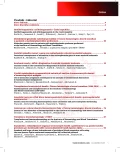-
Medical journals
- Career
Genetic tests for selecting haematopoietic stem cell donors and post-transplant monitoring
Authors: M. Vraná; H. Čechová; K. Pegová; S. Nazarová; A. Vítek
Authors‘ workplace: Ústav hematologie a krevní transfuze, Praha
Published in: Transfuze Hematol. dnes,23, 2017, No. Supplementum1, p. 68-74.
Category:
Overview
Allogeneic haematopoietic stem cell transplantation is one of the curative approaches in haematological malignancies. The aim of our work was to analyse the influence of genetic tests used in the selection of stem cell donor and post-transplant monitoring on patient survival post-transplant. The analysed cohort consisted of 611 transplantations from HLA matched donors.
The section of donor selection assessed the impact of HLA test accuracy. The cohort analysed in this section included 292 patients transplanted from unrelated donors. It was divided according to the genetic methods used. The results showed a statistically significant difference between the group of patients with HLA match genetically determined in HLA class II only and the group with both HLA I and II match tested, respectively (p =value 0.0189). The accuracy of the methods used (PCR with sequence specific primers vs. Sanger sequencing) did not significantly affect the survival of the transplanted patients (p = 0.6077).
The section of post-transplant monitoring evaluated the degree of cell chimerism (complete, mixed, microchimerism) and the method used. This section analysed 474 patients transplanted from unrelated and related donors. A significant difference in survival was observed between patients with complete and mixed chimerism, respectively: p < 0.0001 using Variable Number of Tandem Repeats analysis in combination with Short Tandem Repeats analysis and p = 0.0002 using highly sensitive quantitative real-time PCR.
Detection of mixed chimerism is thus a high-risk factor in the post-transplantation course. The group of patients with microchimerism (p = 0.0201) was also shown to be potentially at risk.
The selection of a suitable donor based on genotypic HLA match and cell chimerism monitoring after transplantation using sensitive methods are prerequisites of a successful allo-HSCT.KEY WORDS:
HLA – chimerism – allo-HSCT – qPCR
Sources
1. Robinson J, Halliwell JA, Hayhurst JH, et al. The IPD and IMGT/HLA Database: allele variant databases. Nucleic Acids Res 2015;43:D423–431.
2. Cechova H, Pegova K, Nadvornikova S, et al. The external proficiency testing and long-term determination of cell chimaerism in The National Reference Laboratory for DNA Diagnostics in the Czech Republic. Tissue Antigens 2016;87(4):268.
3. Mrazek F, Onderkova J, Konigova N, et al. A novel HLA-B allele HLA-B*35 : 279 identified by sequencing-based typing in a Czech pa-tient. Int J Immunogen 2016;43(4):246–248.
4. Alizadeh M, Bernard M, Danic B, et al. Quantitative assessment of hematopoietic chimerism after bone marrow transplantation by real-time quantitative polymerase chain reaction. Blood 2002;99(12):4618–4625.
5. Qin XY, Li GX, Qin YZ, et al. Quantitative assessment of hematopoietic chimerism by quantitative real-time polymerase chain reaction of sequence polymorphism systems after hematopoietic stem cell transplantation. Chin Med J (Engl) 2011;124(15):2301–2308.
6. Leontycova M, Cechova H, Pegova K, et al. Validation study of real-time polymerase chain reaction monoplex and multiplex analysis in chimerism testing. Tissue Antigens 2014;84(1):49.
7. Pegova K, Leontovycova M, Pavlatova L, et al. The choice of suitable polymorphisms for cell chimerism monitoring of patients after allogeneic hematopoietic stem cell transplantation, Tissue Antigens 2017;89(6):416.
8. Bacigalupo A, Lamparelli T, Barisione G, et al. Thymoglobulin prevents chronic graft-versus-host disease, chronic lung dysfunction, and late transplant-related mortality: long-term follow-up of a randomized trial in patients undergoing unrelated donor transplantation. Biol Blood Marrow Transplant 2006;12(5):560–565.
9. Ludajic K, Balavarca Y, Bickeboeller H, et al: Impact of HLA-DPB1 allelic and single amino acid mismatches on HSCT. Brit J Haematol 2008;142(3):436–443.
10. Vraná M, Dobrovolná M, Cetkovský P, Nazarová S, Vondráčková H, Sedláček P. Analýza HLA-DPB1 genu u transplantací hematopoetických kmenových buněk. Čas Lék Čes 2006;145 : 126–129.
11. Crivello P, Zito L, Sizzano F, et al. The impact of amino acid variability on alloreactivity defines a functional distance predictive of permissive HLA-DPB1 mismatches in hematopoietic stem cell transplantation. Biol Blood Marrow Transplant 2015;21 : 233–241.
12. Ahci M, Stempelmann K, Buttkereit U, et al. Clinical utility of quantitative PCR for chimerism and engraftment monitoring after allogeneic stem cell transplantation for hematologic malignancies. Biol Blood Marrow Transplant; publikováno elektronicky 8. června 2017 DOI: 10.1016/j.bbmt.2017.05.031.
13. Koldehoff M, Steckel NK, Hlinka M, Beelen DW, Elmaagacli AH. Quantitative analysis of chimerism after allogeneic stem cell transplantation by real-time polymerase chain reaction with single nucleotide polymorphisms, standard tandem repeats, and Y-chromosome-specific sequences. Am J Hematol 2006;81(10):735–746.
Labels
Haematology Internal medicine Clinical oncology
Article was published inTransfusion and Haematology Today

2017 Issue Supplementum1-
All articles in this issue
- Genetic tests for selecting haematopoietic stem cell donors and post-transplant monitoring
- Centre for rare disorders of haematopoiesis at the Institute of Haematology and Blood Transfusion
- Transfusion and immunohematology at the Institute of Haematology and Blood Transfusion
- Standard and large volume leukapheresis of peripheral blood progenitor cells using the new Spectra Optia continuous mononuclear cell collection protocol
- Dysfibrinogenaemia and afibrinogenaemia in the Czech Republic
- Molecular genetic tests in patients with myelodysplastic syndrome performed at the Institute of Haematology and Blood Transfusion
- Functional consequences of mutations in the nucleophosmin gene in acute myeloid leukaemia
- Current trends in the treatment and diagnostics of chronic myeloid leukaemia
- Use of molecular cytogenetic techniques in the analysis of chromosomal aberrations in haematological malignancies
- Haematopoietic cell transplantation at the Institute of Haematology and Blood Transfusion (1986–2016)
- Transfusion and Haematology Today
- Journal archive
- Current issue
- Online only
- About the journal
Most read in this issue- Dysfibrinogenaemia and afibrinogenaemia in the Czech Republic
- Centre for rare disorders of haematopoiesis at the Institute of Haematology and Blood Transfusion
- Transfusion and immunohematology at the Institute of Haematology and Blood Transfusion
- Functional consequences of mutations in the nucleophosmin gene in acute myeloid leukaemia
Login#ADS_BOTTOM_SCRIPTS#Forgotten passwordEnter the email address that you registered with. We will send you instructions on how to set a new password.
- Career

